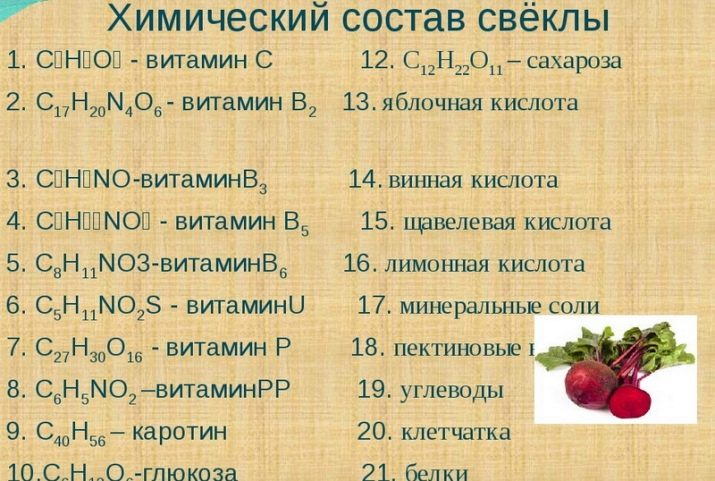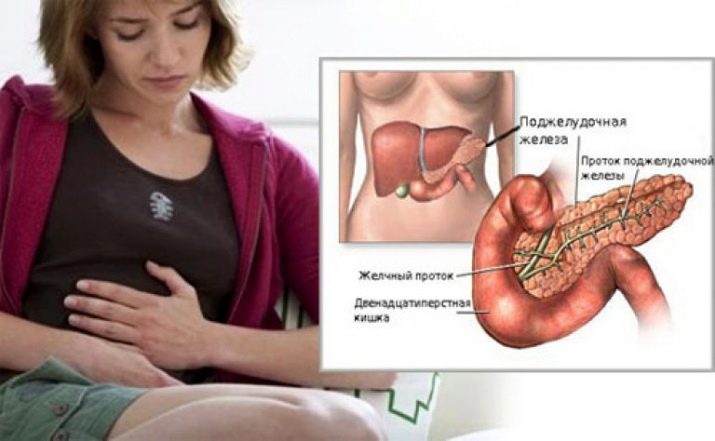Properties and calorie beets

Beetroot is a familiar vegetable familiar to people. But in fact, this root crop is fraught with many unexpected moments.It helps to reveal them acquaintance with the list of substances contained in it and with the results of biomedical research.
The nutritional value
The distribution of BZHU in the composition of beets is (in terms of 0.1 kg):
- 1.5 g of protein;
- 0.1 g of fat;
- 8.8 g of all types of carbohydrates.
Chemical composition
If we refer to the tables showing the concentration of vitamins and minerals in 100 g of edible parts of beets, then The following picture is found:
- A - 2 μg;
- beta carotene - 0.01 mg;
- Riboflavin - 0.04 mg;
- Pantothenic acid - 0.12 mg;
- thiamine, 0.02 mg;
- ascorbic acid - 10 mg;
- pyridoxine - 0.07 mg;
- Niacin - 0.2 mg;
- Vitamin E - 0.1 mg;
- iodine - 7 mcg;
- sulfur - 7 mg;
- potassium - 288 mg;
- manganese - 0.66 mg;
- phosphorus - 43 mg;
- boron - 280 mcg;
- sodium - 46 mg.
The concentration of magnesium is about half the saturation of beet sodium. Moreover, it contains another 37 mg of calcium and 43 mg of chlorine. The share of iron is 1.4 mg, and the concentration of vanadium is 70 μg. The presence of copper is twice as high (140 µg). Interestingly, the amount of rubidium is comparatively large (from 450 µg); molybdenum, fluorine, nickel is much less contained.
Other useful inorganic substances include zinc and chromium. All sugars account for 8.7 g, and the total occurrence of essential amino acids is 0.41 g. Noticeably more - 0.94 g of non-essential amino acids, including glycine and tyrosine. But do not absolutize all these common figures. It is necessary to take into account the method of cooking beets, the variety, its shelf life, age and gender group, health status and other factors in order to draw the right conclusions.
Benefit and harm
Like all vegetables, beets are full of fiber, which has a positive effect on the work of the intestines and the entire digestive system. Regular consumption of the root helps to strengthen the vascular walls. This effect affects both large and small vessels. To get the best result, it is recommended to eat raw beets, occasionally eaten borscht or herring under a fur coat will not give anything.
Also the vegetable helps:
- osteoporosis;
- with the threat of atherosclerosis;
- in the fight against Alzheimer's disease.
There is a beneficial effect of beets on the chemical composition of blood, it becomes closer to the optimum. As a result, slightly developed iron deficiency anemia or other failure with hemoglobin can be corrected very easily. There is no need to use drugs, but the final decision must be taken as directed by the physician. The substances in beetroot will help restore the functioning of the liver and suppress a number of its infectious and non-infectious diseases. It is very important to normalize the metabolism, including water-salt metabolism.
Already in ancient times, raw root vegetable was used to protect against colds. Benefit was also found in young tops of young vegetables, which will help in healing minor injuries to the skin. During pregnancy, beets are very valuable primarily because of the presence of folic acid in it, which helps to maintain normal nutrition of the embryo. Vitamins make even stronger vessels of the eye and fundus, they prevent the formation of cataracts. Both the underground and the surface part of the vegetable are able to assist in eliminating fatigue, because the amount of carbohydrates is high in it.
Stabilization of hormonal levels helps to overcome the psychoemotional load. The use of beet juice suppresses the runny nose and pain in the throat. It reduces a little blood pressure and relieves the heart muscle, prevents the occurrence of blood clots in the vessels. Positive results of the use of beetroot juice were observed in urolithiasis - it improves the elimination of stones (with the exception of the oxaluric type). Great value of this natural drink with gallstone disease.
Beet juice improves sleep and has a generally beneficial effect on the nervous system.But the problem is that simply chop the beets in a juicer does not work, there are several important subtleties. Fresh liquid is not suitable for consumption, it is necessary to wait at least 120 minutes after preparing the drink.
Otherwise, you may encounter:
- nausea;
- headaches;
- indigestion
Even seasoned beet juice is not recommended to be used in its pure form, where it is better to use it as part of mixed drinks. Optimal combinations are obtained with juices squeezed from celery, carrots or pumpkin. Gradually, starting with 10%, the concentration of beet liquid can be increased, but not more than ½ by weight. It is very important to consume a cocktail not at once, but several times during the day. One reception is limited to 5 small sips.
Only in the case when the mixture will not have any negative effect, you can switch to the consumption of pure beet juice. But in this case, you can drink it a maximum of 300 g per day for 14 days. Following this, it is necessary to make a ten-day pause.
The specific properties of the combined fresh juices should be considered separately. Thus, the combination of beets with apples and carrots in the same proportions prevents the development of lung cancer, stomach ulcers. The same drink prevents the occurrence of hypertension and disorders in the pancreas. If you mix ½ share of beets with 2 shares of orange and 1 share of carrots, you can increase the efficiency of ascorbic acid absorption. When ½ share of beets accounts for 1 part of honey or cranberries, it is possible to stabilize the blood pressure in large vessels and calm down. The same mixture is useful for problems with the excretory system. Any of these combinations is very valuable the next day after a tumultuous feast, as it benefits the liver and relieves vascular spasms.
Due to the presence of beta cyanine, beet juice is effective in combating an already developed oncology, of course, not as an independent tool, but as an auxiliary tool. In such cases, even in the postoperative period, a daily intake of 0.2 kg of boiled vegetables and 0.7 kg of mixed fresh is recommended. These portions are divided during the day, respectively, into 2 and 10 receptions. The positive effect is associated not only with the suppression of harmful cells as such, but also with the optimization of blood circulation. Beet helps to restore body tone and physical strength, improves appetite.
It is often possible to encounter the opinion that after heat treatment, the beetroot mass completely loses its beneficial substances. But in reality, they are almost entirely preserved. On the other hand, the irritating effect on the walls of the digestive system decreases, which is typical for a raw vegetable. Therefore, in case of pathologies of this part of the body, boiled, fried or stewed beets are most useful.
A small energy value of the product itself becomes a very significant advantage. This is important not only for the organization of diet, but also for adjusting the diet for specific diseases. Both grated raw beets and juice obtained from it are extremely important for the removal of free radicals and radionuclides. No less important is the ability of the vegetable to enhance the evacuation of salts of heavy metals, each of which has a detrimental effect on the body.
Beets have a positive effect on the thyroid and parathyroid glands, correcting iodine deficiency. Its ability to prevent strokes and heart attacks is noted. Stimulation of parts of the brain that are closely related to speech activity, visual perception and memory, is an extremely valuable feature even for initially healthy people. Keep in mind that the root has a diuretic effect; depending on the state of health and the specific life situation, this can be both useful and very unpleasant.
There is no doubt the cosmetic role of beets in the diet. Systematically people eating it are less likely to face the loss of skin elasticity, it becomes more elastic.Established the undoubted benefits for hair, nails, which are shiny, made stronger. Another important factor is the suppression of harmful microorganisms in the digestive system.
Of course, in case of stable, stable problems of this kind, it is imperative that you consult a doctor.
Beets have a good effect on the state of patients with pancreatitis. But since this disease is very serious, it will also be very important to listen to the opinion of experts. In the initial phase of the pathology, daily consumption starts from 90-100 g of the root, only in the absence of a negative effect, the amount is increased.
Speaking about the harm of beets in the literal sense of the word is not necessary, because it is more correct to evaluate it as partial restrictions or contraindications. Particular caution should be followed by all people with unstable stools. If they consume beets, they should start with small portions and continuously monitor the condition of the body. The presence of oxalic acid is bad for patients with oxaluria. The same acid will also have a negative effect on gastritis sufferers with a reduced acidity of the stomach.
Any type of beet is unacceptable for people with diabetes. It is too sweet, and a jump in the blood sugar level for diabetics can have serious consequences. If the beet juice is planned to be used to combat certain diseases, it is necessary to consult with the doctors. Without their direct permission to use such a drink, especially in its pure form, it is not worth it. Overuse beet threatens hypervitaminosis.
The best option for using beets for children is cooking, a somewhat worse result when baking in the oven. Beet salads are also quite an attractive solution.
The benefits of root vegetables in baby food is expressed in:
- improving thinking and strengthening memory;
- better speech development;
- supporting vision and preventing its diseases;
- increased tone and endurance;
- boosting the metabolism;
- accelerated development of the vascular system.
It is permissible to begin the use of an underground vegetable only no earlier than the age of 8 or 9 months. At this point, give the most minimal dose, only to check the absence of allergies and other contraindications. In the event of any adverse events, even the weakest, you must immediately seek medical help. Regardless of its effectiveness and diagnosis, it is impossible to repeat the test in the next six months.
Both adults and children should be wary of eating beets against the background of osteoporosis.
It is important to remember that this plant and its juice eliminate only the inflammatory forms of rhinitis. Runny nose, provoked by allergies, thus not correct. Of course, for therapeutic purposes, including diet food, only fully mature vegetables with no signs of spoilage are suitable. Wash and clean them as thoroughly as possible. It is even better if they are grown on their own plot with minimal use of toxic chemicals and fertilizers.
Excessive consumption of beets can, instead of improving the health of the vessels, provoke their spasms. Sometimes it is recommended to use not beet juice, but beet kvass. It is less concentrated and less dangerous.
Other techniques help reduce the risk:
- consumption of only warm juice;
- taking it ¼ hour before meals;
- elimination of mixing beets and especially drinks from it with yeast dough.
How many calories does it contain?
Not only for the sick, but also for completely healthy people, the caloric content of beets is of great importance. In raw beets, it is small. But at the same time, it is of the utmost importance how the plant is used. Raw young beets have an energy value of 43 kcal per 100 grams of product. Since the medium-sized vegetable by weight can reach 0.3-0.4 kg, its overall nutritional value is about 150 kcal.
Boiled beets are also not too nutritious, as a result of which they are included in dietary nutrition programs.
The specific use is greatly influenced:
- steaming increases the energy value of the vegetable by 1 kcal (that is, up to 44);
- consumption of boiled root water with garlic and mayonnaise will “pull” by 112 kcal per 100 grams;
- replacing mayonnaise with oil will reduce caloric content to 95 kcal per 100 g;
- if you use sour cream with a fat content of 15%, the nutritional value will be reduced to 65 kcal.
It should be borne in mind that beets are always boiled without salt, so this component and its effect on nutrition, on the fluid balance in the body can be almost ignored. The benefit of the body can bring beet broth, which has a laxative and diuretic effect. He also contributes to the restoration of the liver. Baked red beet on the combination of useful properties is even better than boiled vegetables. As for its nutritional value, it reaches 440 kcal per 1 kg.
Braised beet mass is much more caloric, even when processed just on water, the nutritional value is 750 kcal per 1 kg. If you use other schemes in which oil, salt and sugar are used, the result will be even more “impressive”, which will not suit those seeking to lose weight. As for the pickled variety of vegetable, it is naturally inferior to the beneficial characteristics of fresh beets. This is characteristic even of home-cooked fruits, and there is no reason to say about store products. But the nutritional value is rather low and is limited to 65 kcal per 100 g.
Beet juice of the same mass has a caloric content of 42 kcal, that is, in one glass contains on average 84 kcal. But since the use of the drink is evenly distributed throughout the day, and the value itself is small and ultimately they can be safely ignored. If you make beetroot salad and fill it with vegetable oil, you get a tasty dish with a caloric content of 102 kcal per 100 g. A portion of this salad contains 5.9 g of fat, 10.7 g of carbohydrates and 1.7 g of protein. For stewed vegetables, these figures are respectively 5.6, 12.1 and 2.6 g.
Quenching is also useful because the finished dish contains gamma-aminobutyric acid, which is an important link in the brain. Due to the saturation of pectins and fiber, the removal of harmful substances from the intestine is improved. In addition, fiber additionally reduces the real energy value of the product, because it is not absorbed, but requires certain efforts from the digestive system. It is important to remember that adding or removing individual components, changing the processing mode can have a very serious impact on the nutritional value of the dish. Yellow beets have a nutritional value of 50 kcal, mashed potatoes - 70, dried weight - 254 and tops - 17 kcal.
Caloric value of other options is as follows (in calories):
- pie - 156;
- soup puree - 73;
- caviar - 47;
- stuffed mass - 88;
- coconut rice with beets - 124 kcal.
Beetroot powder contains 11 g of proteins, 68.3 g of carbohydrates (per 100 g of the product itself). The concentration of fat is zero. Nutritional value is 317 kcal. But we must bear in mind that all these figures relate to the average product. Peculiarities of origin and processing affect its properties very much. Calorie soup beetroot in terms of 1 typical batch (0.25 kg) is equal to 60.6 kcal, while it contains 2.1 g of fat and protein, 8.9 g of carbohydrates.
A minor laxative effect has a positive effect on the prospects of losing weight. For them, suitable as fasting days, and beet monodiets. A good option would also be the consumption of boiled beets with olive oil as an afternoon snack. Such food schemes not only do not create a negative effect, they contribute to improving mood. That, alas, cannot be said about many alternatives.
The nutritional value of 100 g of soup from young beets is limited to 14.8 kcal. Moreover, it contains 0.5 g of protein, 0.1 g of fat and 3.1 g of carbohydrates.Preparing boiled beet leaves without salt, you can get a dish with a nutritional value of 27 kcal, or 1.6% of the daily norm of an inactive worker.
On the beneficial properties of beets, see the following video.



















































